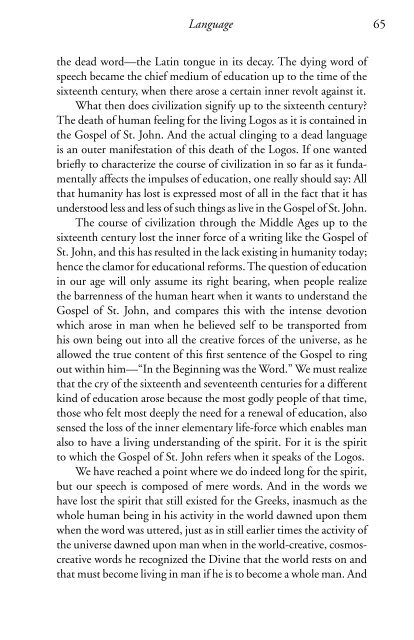Teaching Language arTs in The WaLdorf schooL
Teaching Language arTs in The WaLdorf schooL
Teaching Language arTs in The WaLdorf schooL
You also want an ePaper? Increase the reach of your titles
YUMPU automatically turns print PDFs into web optimized ePapers that Google loves.
<strong>Language</strong><br />
65<br />
the dead word—the Lat<strong>in</strong> tongue <strong>in</strong> its decay. <strong>The</strong> dy<strong>in</strong>g word of<br />
speech became the chief medium of education up to the time of the<br />
sixteenth century, when there arose a certa<strong>in</strong> <strong>in</strong>ner revolt aga<strong>in</strong>st it.<br />
What then does civilization signify up to the sixteenth century?<br />
<strong>The</strong> death of human feel<strong>in</strong>g for the liv<strong>in</strong>g Logos as it is conta<strong>in</strong>ed <strong>in</strong><br />
the Gospel of St. John. And the actual cl<strong>in</strong>g<strong>in</strong>g to a dead language<br />
is an outer manifestation of this death of the Logos. If one wanted<br />
briefly to characterize the course of civilization <strong>in</strong> so far as it fundamentally<br />
affects the impulses of education, one really should say: All<br />
that humanity has lost is expressed most of all <strong>in</strong> the fact that it has<br />
understood less and less of such th<strong>in</strong>gs as live <strong>in</strong> the Gospel of St. John.<br />
<strong>The</strong> course of civilization through the Middle Ages up to the<br />
sixteenth century lost the <strong>in</strong>ner force of a writ<strong>in</strong>g like the Gospel of<br />
St. John, and this has resulted <strong>in</strong> the lack exist<strong>in</strong>g <strong>in</strong> humanity today;<br />
hence the clamor for educational reforms. <strong>The</strong> question of education<br />
<strong>in</strong> our age will only assume its right bear<strong>in</strong>g, when people realize<br />
the barrenness of the human heart when it wants to understand the<br />
Gospel of St. John, and compares this with the <strong>in</strong>tense devotion<br />
which arose <strong>in</strong> man when he believed self to be transported from<br />
his own be<strong>in</strong>g out <strong>in</strong>to all the creative forces of the universe, as he<br />
allowed the true content of this first sentence of the Gospel to r<strong>in</strong>g<br />
out with<strong>in</strong> him—“In the Beg<strong>in</strong>n<strong>in</strong>g was the Word.” We must realize<br />
that the cry of the sixteenth and seventeenth centuries for a different<br />
k<strong>in</strong>d of education arose because the most godly people of that time,<br />
those who felt most deeply the need for a renewal of education, also<br />
sensed the loss of the <strong>in</strong>ner elementary life‐force which enables man<br />
also to have a liv<strong>in</strong>g understand<strong>in</strong>g of the spirit. For it is the spirit<br />
to which the Gospel of St. John refers when it speaks of the Logos.<br />
We have reached a po<strong>in</strong>t where we do <strong>in</strong>deed long for the spirit,<br />
but our speech is composed of mere words. And <strong>in</strong> the words we<br />
have lost the spirit that still existed for the Greeks, <strong>in</strong>asmuch as the<br />
whole human be<strong>in</strong>g <strong>in</strong> his activity <strong>in</strong> the world dawned upon them<br />
when the word was uttered, just as <strong>in</strong> still earlier times the activity of<br />
the universe dawned upon man when <strong>in</strong> the world-creative, cosmoscreative<br />
words he recognized the Div<strong>in</strong>e that the world rests on and<br />
that must become liv<strong>in</strong>g <strong>in</strong> man if he is to become a whole man. And

















